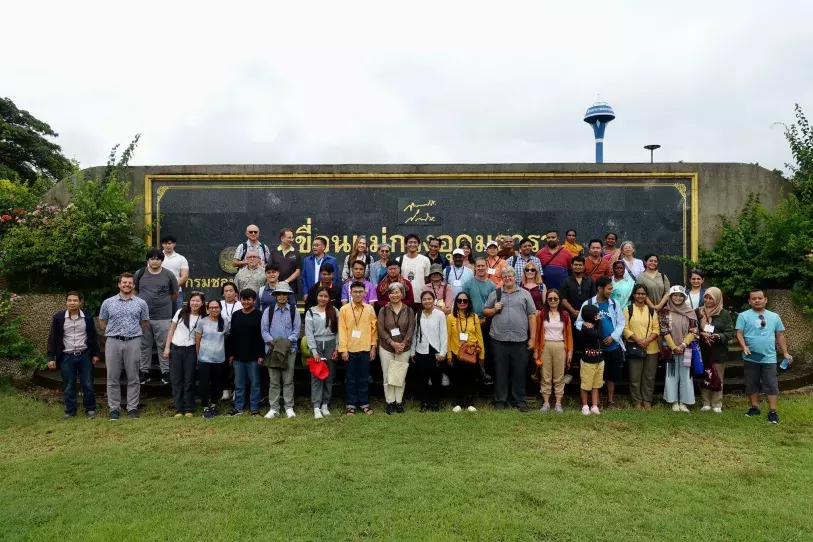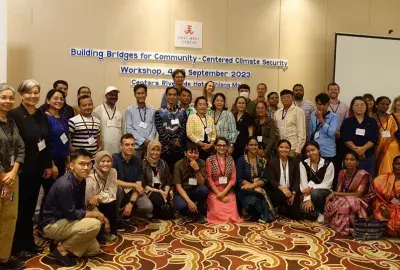
OFFICE/DEPARTMENT
Convening Inclusive Dialogues across South and Southeast Asia
There is an urgent need for community engagement on climate change, as climate-linked disasters increase in frequency and severity, leading to food insecurity, livelihood threats, and displacement. Traditional state-centered decision-making often sidelines marginalized perspectives. Against this backdrop, the Building Bridges for Community-Centered Climate Resilience project aims to develop responsive, equitable approaches to climate security.
This project addresses the pressing issue of climate change impacts and their disproportionate effects on vulnerable communities. While global efforts for climate adaptation have struggled to support those most in need, the project aims to connect climate policy with those directly affected by climate change through a two-step convening model.
Comprising participants from communities, civil society, and local-level journalists across South and Southeast Asian countries, the project focuses on three key themes: human-environment transitions, inclusive governance, and resilient livelihoods. The goal is to bridge the gap between policy and marginalized voices by documenting community concerns through innovative projects and methods.
The project entails two four-day convenings in Southeast Asia, engaging representatives from seven countries across South Asia and Southeast Asia (India, Bangladesh, Myanmar, Thailand, Cambodia, Vietnam, and Indonesia). The first convening was held in Chiang Mai, Thailand in September 2023 and included 37 participants who discussed community perspectives on climate change. Participants consisted of local community members, civil society organizations, and individuals actively supporting communities working on issues related to land, water, and forests. Over four days participants conducted a series of talk stories, simulations, and sharing exercises to spotlight local issues on environmental change, livelihoods, and governance, specifically concerning institutional pathways to more sustainable climate solutions. Read more about the workshop in this reflective piece from our Bangladeshi participants titled “Empathy: A Key Enabler for Harnessing Effective Community-centered Adaptation” and find out more about the ‘Frontline Voices’ of Community-Centered Climate Resilience featured through this project.
The second convening will be held in Makassar, Indonesia in May 2024. This convening will allow country teams to present findings from small projects that they have designed and implemented since the first convening in Chiang Mai. These findings will highlight innovative methods of engaging their communities and the challenges that these communities are facing in relation to climate change. The convening will feature a field visit to the Kajang indigenous community in South Sulawesi, facilitate discussions around the gaps between climate policy and marginalized communities, and offer recommendations for bridging these gaps at both community and policy levels.
Project Team
Micah Fisher, Research Fellow and Co-Investigator; Country lead, Indonesia.
Sandeep Kandikuppa, Research Fellow; Country lead, India.
Emilie Parry, Seminars Program Coordinator; Country lead, Bangladesh.
Kevin Woods, Research Fellow; Country lead, Myanmar.
Ming Li Yong, Research Fellow and Co-Investigator; Country lead, Thailand and Cambodia.
This project is supported by a grant from the Rockefeller Foundation.
Convening Inclusive Dialogues across South and Southeast Asia
There is an urgent need for community engagement on climate change, as climate-linked disasters increase in frequency and severity, leading to food insecurity, livelihood threats, and displacement. Traditional state-centered decision-making often sidelines marginalized perspectives. Against this backdrop, the Building Bridges for Community-Centered Climate Resilience project aims to develop responsive, equitable approaches to climate security.
This project addresses the pressing issue of climate change impacts and their disproportionate effects on vulnerable communities. While global efforts for climate adaptation have struggled to support those most in need, the project aims to connect climate policy with those directly affected by climate change through a two-step convening model.
Comprising participants from communities, civil society, and local-level journalists across South and Southeast Asian countries, the project focuses on three key themes: human-environment transitions, inclusive governance, and resilient livelihoods. The goal is to bridge the gap between policy and marginalized voices by documenting community concerns through innovative projects and methods.
The project entails two four-day convenings in Southeast Asia, engaging representatives from seven countries across South Asia and Southeast Asia (India, Bangladesh, Myanmar, Thailand, Cambodia, Vietnam, and Indonesia). The first convening was held in Chiang Mai, Thailand in September 2023 and included 37 participants who discussed community perspectives on climate change. Participants consisted of local community members, civil society organizations, and individuals actively supporting communities working on issues related to land, water, and forests. Over four days participants conducted a series of talk stories, simulations, and sharing exercises to spotlight local issues on environmental change, livelihoods, and governance, specifically concerning institutional pathways to more sustainable climate solutions. Read more about the workshop in this reflective piece from our Bangladeshi participants titled “Empathy: A Key Enabler for Harnessing Effective Community-centered Adaptation” and find out more about the ‘Frontline Voices’ of Community-Centered Climate Resilience featured through this project.
The second convening will be held in Makassar, Indonesia in May 2024. This convening will allow country teams to present findings from small projects that they have designed and implemented since the first convening in Chiang Mai. These findings will highlight innovative methods of engaging their communities and the challenges that these communities are facing in relation to climate change. The convening will feature a field visit to the Kajang indigenous community in South Sulawesi, facilitate discussions around the gaps between climate policy and marginalized communities, and offer recommendations for bridging these gaps at both community and policy levels.
Project Team
Micah Fisher, Research Fellow and Co-Investigator; Country lead, Indonesia.
Sandeep Kandikuppa, Research Fellow; Country lead, India.
Emilie Parry, Seminars Program Coordinator; Country lead, Bangladesh.
Kevin Woods, Research Fellow; Country lead, Myanmar.
Ming Li Yong, Research Fellow and Co-Investigator; Country lead, Thailand and Cambodia.
This project is supported by a grant from the Rockefeller Foundation.


